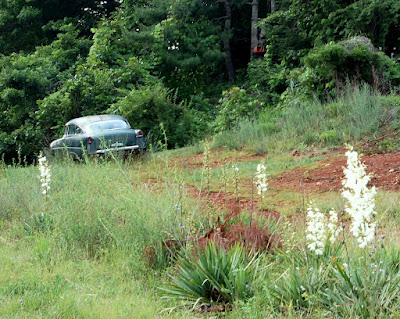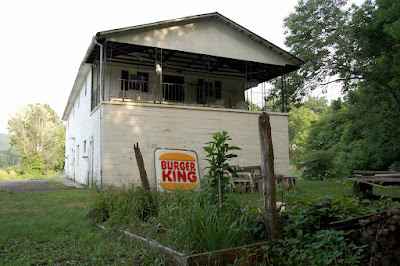











All of the above photos were taken in various parts of southwest Virginia. If I were going to do a book of "Appalachian images," I think I would include some of these. I'm bothered by books (writing or photography) that exploit negative stereotypes of Appalachia to create intrigue, but I'm often equally bothered by books that replace those negative stereotypes with overly positive, romanticized constructions of Appalachia. I often feel like a large slice of the Appalachia I grew up in, the kind of people I know, are being written out of existence because they aren't necessarily the face other Appalachians (or non-Appalachians with an interest in defining Appalachia) want to project.
I grew up in Grayson County, and I was probably one of the last people to live a life similar to how mountain people lived 100 years ago. I usually stayed with my grandmother; she got her water from a spring up the (dirt) road, had an outhouse, heated with a wood stove, checked her hens' nests and rabbit gums every morning, went looking for morels every spring, raised a garden and canned food, dipped snuff, and so on.
This is the kind of stuff that's sometimes romanticized, but our way of life wasn't easy or charming in its simplicity. We often traded food stamps for money to buy gas or scraped between cushions to have enough money to buy an RC cola. I recall buying 5 cent pieces of gum with a 1 dollar food stamp to get 95 cents in change. I'd do this at six or so stores until we had enough money to buy 5 dollars or so in gas. Also, many people in my family did drugs, hunted solely for the pleasure of killing, abused family members, etc. Many were depressed, lonely, fatalistic, and desperate. But then I've known others who always seemed content, no matter what the situation.
I'm not clearly articulating what I want to say here; basically, I'm trying to say that all of these things are Appalachia and none of them are Appalachia. I don't believe in a monolithic Appalachian culture, and I'm wary of those who claim to speak for everyone else in a region that comprises many different cultures, social classes, and even idiosyncrasies within particular families. I'd like to see a more fluid notion of Appalachia, one that acknowledges clapboard houses/$500 trailers and $200,000 cookie-cutter homes in the suburbs, blue-grass and what Chuck Klosterman calls "Wal-Mart country," cockfighting and quilting. Although its good for tourism, I'm not fond of the packaged version of Appalachia that's sold to outsiders (and, curiously, even those who grew up in Appalachia). Rather than preserving it or keeping it alive, it seems to me that turning Appalachia into a commodity depletes it.
Of course, my thoughts about this are always shifting; I don't like settling on anything too quickly, so if you have any thoughts send me a comment.

1 comment:
I like the chicken.
Post a Comment